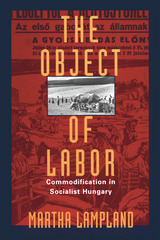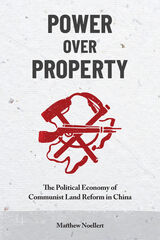5 books about Collectivization of agriculture

The Collectivization of Agriculture in Communist Eastern Europe
Comparison and Entanglements
Constantin Iordachi
Central European University Press, 2014
This book explores the interrelated campaigns of agricultural collectivization in the USSR and in the communist dictatorships established in Soviet-dominated Eastern Europe. Despite the profound, long-term societal impact of collectivization, the subject has remained relatively underresearched. The volume combines detailed studies of collectivization in individual Eastern European states with issueoriented comparative perspectives at regional level. Based on novel primarysources, it proposes a reappraisal of the theoretical underpinnings and research agenda of studies on collectivization in Eastern Europe.The contributions provide up-to-date overviews of recent research in the field and promote new approaches to the topic, combining historical comparisons with studies of transnational transfers and entanglements.
[more]

The Object of Labor
Commodification in Socialist Hungary
Martha Lampland
University of Chicago Press, 1995
Did socialist policies leave the economies of Eastern Europe unprepared for current privatization efforts? Under communist rule, were rural villages truly left untouched by capitalism? In this historical ethnography of rural Hungary, Martha Lampland argues not only that the transition to capitalism was well under way by the 1930s, but that socialist policies themselves played a crucial role in the development of capitalism by transforming conceptions of time, money, and labor.
Exploring the effects of social change thrust upon communities against their will, Lampland examines the history of agrarian labor in Hungary from World War I to the early 1980s. She shows that rural workers had long been subject to strict state policies similar to those imposed by collectivization. Since the values of privatization and individualism associated with capitalism characterized rural Hungarian life both prior to and throughout the socialist period, capitalist ideologies of work and morality survived unscathed in the private economic practices of rural society. Lampland also shows how labor practices under socialism prepared the workforce for capitalism. By drawing villagers into factories and collective farms, for example, the socialist state forced farmers to work within tightly controlled time limits and to calculate their efforts in monetary terms. Indeed, this control and commodification of rural labor under socialism was essential to the transformation to capitalism.
Exploring the effects of social change thrust upon communities against their will, Lampland examines the history of agrarian labor in Hungary from World War I to the early 1980s. She shows that rural workers had long been subject to strict state policies similar to those imposed by collectivization. Since the values of privatization and individualism associated with capitalism characterized rural Hungarian life both prior to and throughout the socialist period, capitalist ideologies of work and morality survived unscathed in the private economic practices of rural society. Lampland also shows how labor practices under socialism prepared the workforce for capitalism. By drawing villagers into factories and collective farms, for example, the socialist state forced farmers to work within tightly controlled time limits and to calculate their efforts in monetary terms. Indeed, this control and commodification of rural labor under socialism was essential to the transformation to capitalism.
[more]

Power over Property
The Political Economy of Communist Land Reform in China
Matthew Noellert
University of Michigan Press, 2020
Following the end of World War II in 1945, the Chinese Communist Party (CCP) spent the next three decades carrying out agrarian reform among nearly one-third of the world’s peasants. This book presents a new perspective on the first step of this reform, when the CCP helped redistribute over 40 million hectares of land to over three hundred million impoverished peasants in the nationwide land reform movement. This land reform, the founding myth of the People’s Republic of China (1949–present) and one of the largest redistributions of wealth and power in history, embodies the idea that an equal distribution of property will lead to social and political equality.
Power Over Property argues that in practice, however, the opposite occurred: the redistribution of political power led to a more equal distribution of property. China’s land reform was accomplished not only through the state’s power to define the distribution of resources, but also through village communities prioritizing political entitlements above property rights. Through the systematic analysis of never-before studied micro-level data on practices of land reform in over five hundred villages, Power Over Property demonstrates how land reform primarily involved the removal of former power holders, the mobilization of mass political participation, and the creation of a new social-political hierarchy. Only after accomplishing all of this was it possible to redistribute land. This redistribution, moreover, was determined by political relations to a new structure of power, not just economic relations to the means of production.
The experience of China’s land reform complicates our understanding of the relations between economic, social, and political equality. On the one hand, social equality in China was achieved through political, not economic means. On the other hand, the fundamental solution was a more effective hierarchy of fair entitlements, not equal rights. This book ultimately suggests that focusing on economic equality alone may obscure more important social and political dynamics in the development of the modern world.
Power Over Property argues that in practice, however, the opposite occurred: the redistribution of political power led to a more equal distribution of property. China’s land reform was accomplished not only through the state’s power to define the distribution of resources, but also through village communities prioritizing political entitlements above property rights. Through the systematic analysis of never-before studied micro-level data on practices of land reform in over five hundred villages, Power Over Property demonstrates how land reform primarily involved the removal of former power holders, the mobilization of mass political participation, and the creation of a new social-political hierarchy. Only after accomplishing all of this was it possible to redistribute land. This redistribution, moreover, was determined by political relations to a new structure of power, not just economic relations to the means of production.
The experience of China’s land reform complicates our understanding of the relations between economic, social, and political equality. On the one hand, social equality in China was achieved through political, not economic means. On the other hand, the fundamental solution was a more effective hierarchy of fair entitlements, not equal rights. This book ultimately suggests that focusing on economic equality alone may obscure more important social and political dynamics in the development of the modern world.
[more]

Transforming Peasants, Property and Power
The Collectivization of Agriculture in Romania, 1949–1962
Constantin Iordachi
Central European University Press, 2009
The subject matter of the volume is part of larger research agenda on the process of land collectivization in the former communist camp, focusing on state, identity and property. The main innovation of the volume is to apply recent interdisciplinary approaches to the study of the collectivization process, asking what types of new peasant-state relations it formed and how it transformed notions of self, persons, and things (such as land). The project conceived of changes in the system of ownership as causing changes in the identity and attitude of people; similarly, it regarded the study of personal identities as essential for understanding changes in the system of ownership. This perspective is rare in the area-studies approaches to the topic.
[more]

The Village and the Class War
Anti-Kulak Campaign in Estonia 1944-49
Anu Mai Kõll
Central European University Press, 2013
Before collectivization of agriculture in Estonia, “kulaks” (better-off farmers) were persecuted and many of them were finally deported in March 1949. This book is situated on the local level; the aim is to understand what these processes meant from the perspective of the Estonian rural population, a kind of study that has been missing so far.Analyzes the mechanisms of repression, applying new aspects. Repression was mainly conducted through a bureaucratic process where individual denunciations were not even necessary. The main tool of persecution was a screening of the rural population with the help of records, censuses and local knowledge, in order to identify, or invent, “kulak families”. Moreover, in the Estonian sources, the World War II history of each individual was a crucial part of screenings. The prisoners of war of the Red Army, held in camps in Estonia, played an unexpected part in this campaign. Another result is a so far neglected wave of peaceful resistance as the kulak identifications were challenged in 1947-48. This has not been addressed in the existing literature. The results mainly answer the question “how” this process worked, whereas the question ”why” finds hypothetical responses in the life trajectories of actors.
[more]
READERS
Browse our collection.
PUBLISHERS
See BiblioVault's publisher services.
STUDENT SERVICES
Files for college accessibility offices.
UChicago Accessibility Resources
home | accessibility | search | about | contact us
BiblioVault ® 2001 - 2025
The University of Chicago Press









